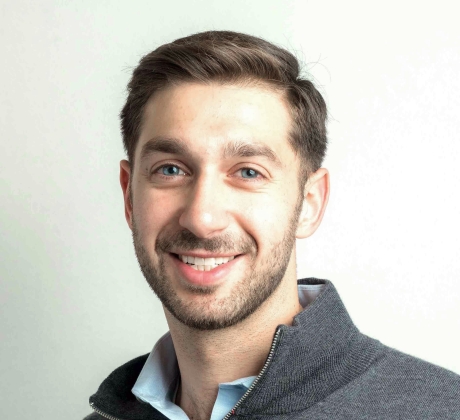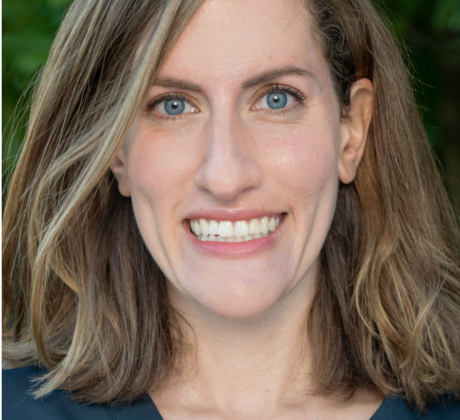Stephanie Ostroff is a speech-language pathologist and journalist. She enjoys blending knowledge from both fields to shine a light on innovators and changemakers in health care.


Corey Feldman, MBA, MHCI, drives forward companies and his career with a solid foundation in health care innovation.
Careers in health care don’t come with blueprints.
For Corey Feldman, the building blocks were anything but predictable. Three years as a staff sergeant in the Israeli Defense Forces. Cracking the South American market as a sales executive for an international adtech company. And eventually, closing deals with hundreds of medical facilities while working for a digital health startup.
It was about two years into the latter role, as Senior Director of Enterprise Solutions at Parachute Health, that Feldman realized he needed something more.
“I had become a product expert,” he says, “but didn’t necessarily understand the larger ecosystem and how it all fit together.”
It was time to bridge the gap between himself and the rest of health care.
Leveling Up with the MHCI
In 2019, Feldman landed on Penn’s Master of Health Care Innovation (MHCI) while searching for a more “holistic” understanding of the field. He knew the nuts and bolts of sales and how to launch a business from the ground up. He was completing an MBA. Yet health care as a whole remained out of view.
“Health care is too big and too broad for any one person to truly have a grasp of how it all works,” says Feldman. “All the more so on the business side of things, spending most of your career selling something or working on one product.”
While managing business development at Parachute, Feldman came across an article by Roy Rosin, MBA that sparked his interest. A longtime follower of Rosin’s and inspired by his fearless launch of pilots in the health care space, Feldman connected with the Penn Medicine Chief Innovation Officer over email. What emerged was a working relationship between the two–and the discovery that Rosin was a faculty member in the MHCI.
Generating Momentum During a Pandemic
Feldman entered the MHCI half a year before COVID-19 made headlines. By Spring 2021, he had served in numerous sales leadership roles, helping to grow digital healthcare startups from the ground up while completing his degree.
Rosin’s course, “Translating Ideas Into Outcomes,” was readily applicable as Feldman began a new role as Vice President of Business Development at emmacare in February 2020. As the digital health startup’s first hire, Feldman was charged with selling a chronic care management platform to physicians while COVID cases surged. Delivering results during an unanticipated global crisis was a challenge; Feldman relied on wisdom from the MHCI to push him forward.
“What’s the smallest bit of this that you can take off as a starting point?” Feldman recalls professors saying when he identified problems in class. They would challenge him: “Too big, too big, too big: How do you make it smaller?” Feldman says he began to think about challenges in terms of, “What is the low hanging fruit here? Where can I start to gather some momentum?”
As a result of the program, I thought more broadly about the areas of health care that I wanted to impact in the next couple of decades.
Feldman also generated momentum with his classmates, helping to launch the Society for Health Care Innovation and spearheading its podcast, Healthcare Reimagined. He says the podcast, which initially gathered pandemic insights from health care and business leaders, was “birthed from the relationships formed in the program.” Over time, Healthcare Reimagined has evolved, with Feldman bringing on experts like Stephen Klasko, MD, MBA, former president and CEO at Thomas Jefferson University and Jefferson Health and Meena Seshamani, MD, PhD, Director at the Center for Medicare.
Accelerating Career and Business Growth
New perspective from coursework and the MHCI community brought Feldman’s career objectives into sharper focus.
“As a result of the program, I thought more broadly about the areas of health care that I wanted to impact in the next couple of decades,” he says.
Feldman identified three categories where he saw an “unmet need”: behavioral health, value-based care, and the management and treatment of chronic disease. He began interviewing for leadership roles at organizations where he could gain experience in one or more of these realms. Ultimately, he landed a role as Head of Growth at Eleos Health, an early-stage startup with an emphasis on behavioral health and value-based care.
As the company’s first sales hire and tenth employee, Feldman built a team and a pipeline of $4.5 million in Annual Recurring Revenue within six months. The experience was a perfect complement to his final semester in the MHCI.
“I really dove pretty deeply into that space and then came to understand the challenges, the shortcomings, the massive shortage of clinicians,” Feldman says.
Today, he brings these insights and a broad view of health care developed in the MHCI to his role as Vice President of Business Development at Leverage Health. There, he partners with health care plans and companies to tackle challenges like cost of care and member experience.
“Leverage is a job that I don’t know that I would have gotten without the MHCI,” says Feldman. “Now I get to put into practice what we learned about in theory vis-à-vis what’s important to the various stakeholders in different organizations and how innovation fits within them–and how you move it within these large systems.”
Healthcare Reimagined, the Society for Health Care Innovation’s podcast, is available to stream on Spotify and Apple Podcasts.

